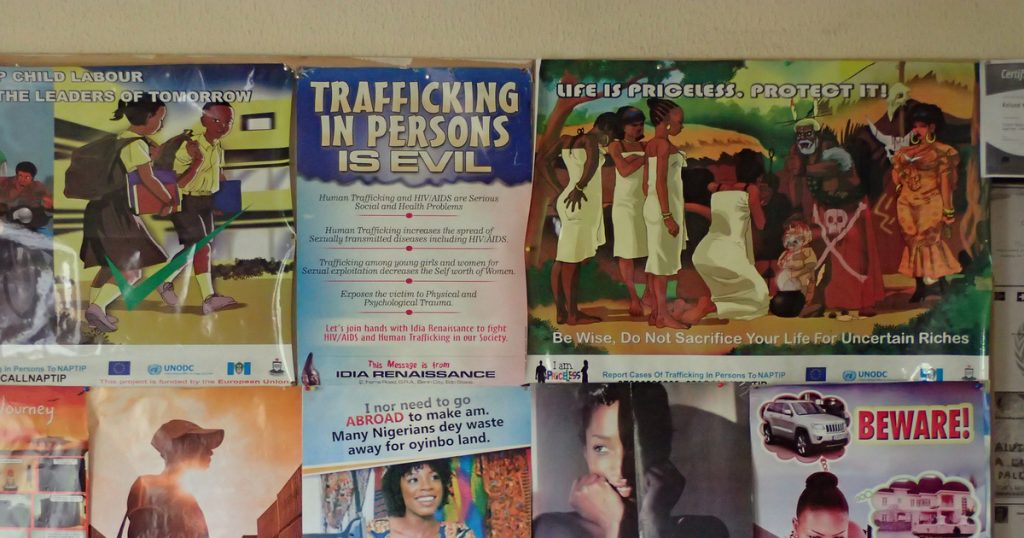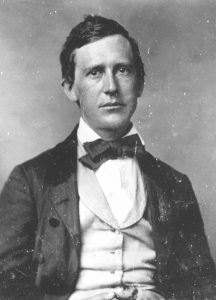Traditionally, when one imagines how someone ends up in slavery of any kind, one sees images of people being forcibly taken from their homes and sent to a foreign country, with absolutely no say in the matter. While this is usually the case in sexual slavery and for other kinds of bondage, it is no longer the case for women from Edo State in Nigeria, that provides 80% of women trafficked into Europe.1 Instead, there is a new phenomenon where women seek out passage to Europe through Madams, knowingly entering into prostitution. This was not always been the case, but extreme poverty, where some even lack running water, this practice has begun flourishing.2

Previously, recruiters lure women with tales of jobs in Europe, working for wealthy families, being hairdressers or nannies, only to find out the harsh reality of forced sex work once they arrived. Eventually, returning with embellished stories of wealth to tempt and recruit women themselves, completing the vicious cycle from victim to perpetrator. Some of the Madams even live in lavish houses, behind gates, as a testament of just what can be earned in European sex work. This show of wealth, in a desperate state, slowly began to transform just how women were recruited into the sex trafficking world.3
More recently, traffickers are being sought out by their victims in hope for a better life for themselves and their families.4 Little do they know of the harsh conditions and abuse they will endure before they can ever return home. After discussion of the “terms” of the work, the women sign legally binding contracts that say they will pay back rent, travel expenses, food, and other miscellaneous expenses, sometimes in a matter of months, sometimes in many years. These expenses total anywhere from 30,000 to 60,000 US dollars, on average. Usually, the women charge 5 to 10 US dollars per client, requiring them to work from sunup to sundown, and sometimes longer.5

Aside from relying on the signed contracts, Madams and pimps use the threat of violence against families, and religion, to keep the women from leaving.6 Using black magic referred to as JuJu, priests perform complex rituals that include eating raw chicken hearts, harm to oneself, drinking cocktails of their own fingernails, hair, and blood, as well as other methods, to bind the women with their traffickers. After completion of the rituals, they are made to feel that death, insanity, or harm will come to their families if they are to break their oath of repayment. A priest, who has benefited greatly from Madams and the pimps he has helped, stated in an interview that the purpose of these rituals are that “she never sleeps well or has peace of mind until she pays what she owes.”7

Furthermore, religion and belief in the negative effects that stem from the severance of the oaths have even led parents to become more complacent and insist that their daughters follow the requests of the people who are exploiting them.8 This, coupled with extreme poverty, exacerbate the growing phenomenon in Edo State, rendering it even more difficult to combat. Though, there are efforts to better the lives of women in Edo State. Education promotes agricultural development and other “basic needs industries,” and is central to the campaigns to inform about the horrors and negative effects of trafficking, and working toward the decriminalization, not legalization, of prostitution to help, instead of punish, those who have been ensnared in a vicious cycle of abuse which is making strides.9
New policies and rules are being implemented and promoted by grassroots organizations, and governments are taking notice. On November 15, 2000, the UN established a “Protocol to Prevent, Suppress and Punish Trafficking in Persons, Especially Women and Children, supplementing the United Nations Convention against Transnational Organized Crime,” which has 173 signatories, showing the world that these malum in se actions have become malum prohibitum or universally illegal, and punishable internaitonally.10 Even with all of these measures, and the recognition of this epidemic at an international level, there are still roughly 4.8 million people (19% of all humans trafficked) enslaved for sexual exploitation in the world, bringing in 99 billion dollars annually (66% of all profits from human trafficking).11 More must be done to end all forms of human trafficking, and it starts with a deeper understanding of the differing local and cultural patterns of recruitment throughout the world. Education and the provision of alternative work options remain the most powerful deterrents.
- Seema Kawar, From Benin City to the Shores of Italy: A New Hub of Human Trafficking, NAOC, (Accessed January 31, 2018), http://natoassociation.ca/from-benin-city-to-the-shores-of-italy-a-new-hub-of-human-trafficking/. ↵
- Abaobi Tricia Nwaubani, Cycle of exploitation turns Nigerian sex slaves in Italy into traffickers, News.trust.org, (Accessed February 12, 2018), http://news.trust.org/item/20161108000327-qfsaw/. ↵
- Abaobi Tricia Nwaubani, Cycle of exploitation turns Nigerian sex slaves in Italy into traffickers, News.trust.org, (Accessed February 12, 2018), http://news.trust.org/item/20161108000327-qfsaw/. ↵
- Abaobi Tricia Nwaubani, Cycle of exploitation turns Nigerian sex slaves in Italy into traffickers, News.trust.org, (Accessed February 12, 2018), http://news.trust.org/item/20161108000327-qfsaw/. ↵
- Esohe Aghatise, Iroko Onlus: Working to Combat the Trafficking of Nigerian Women and Girls Into Italy, Canadian Woman Studies 22, no. 3/4 (2003): 197-199, Humanities Full Text (H.W. Wilson), EBSCOhost (accessed January 31, 2018). ↵
- Esohe Aghatise, Iroko Onlus: Working to Combat the Trafficking of Nigerian Women and Girls Into Italy, Canadian Woman Studies 22, no. 3/4 (2003): 197-199, Humanities Full Text (H.W. Wilson), EBSCOhost (accessed January 31, 2018). ↵
- C. S. Baarda, Human trafficking for sexual exploitation from Nigeria into Western Europe: The role of voodoo rituals in the functioning of a criminal network, European Journal Of Criminology 13, no. 2 (2016): 257, Complementary Index, EBSCOhost (accessed January 31, 2018). ↵
- Abaobi Tricia Nwaubani, Cycle of exploitation turns Nigerian sex slaves in Italy into traffickers, News.trust.org, (Accessed February 12, 2018), http://news.trust.org/item/20161108000327-qfsaw/. ↵
- Esohe Aghatise, Iroko Onlus: Working to Combat the Trafficking of Nigerian Women and Girls Into Italy, Canadian Woman Studies 22, no. 3/4 (2003): 197-199, Humanities Full Text (H.W. Wilson), EBSCOhost (accessed January 31, 2018). ↵
- United Nations, Protocol to Prevent, Suppress and Punish Trafficking in Persons, Especially Women and Children, supplementing the United Nations Convention against Transnational Organized Crime, International Law & World Order: Westons & Carlsons Basic Documents, November 15, 2000, doi:10.1163/2211-4394_rwilwo_sim_033351. ↵
- Human Trafficking by the Numbers, Human Rights First, January 7, 2017. (Accessed February 12, 2018), https://www.humanrightsfirst.org/resource/human-trafficking-numbers. ↵



90 comments
Julissa Cantu
Sex trafficking, of course, is a very important topic considering it affects a great amount of women around the world. Also, due to the prevalence of colorism globally, women of color and the struggles they endure are constantly ignored or forgotten. Separately, there were, unfortunately, many sentences that could have been proofread to produce the best article as well as some sections that could have been organized better. Proofreading is an author’s best friend.
Natalie Juarez
1) Sexual exploitation of women and human trafficking is known but it isn’t really talked about, so I was eager to read this article to learn more about what leads women to this passage. My knowledge of human trafficking was just like what was mentioned in the first paragraph, which was that people get kidnapped into human trafficking, and I now know that is not always the case. It disheartens me to learn that extreme poverty is a driving force that recruit women into the sex trafficking world. The part about the cruel rituals being done to women, so that they cannot sleep or have peace of mind told me that Madams and pimps did not value these women’s well being. This article is informative, organized and well written. Thanks for talking about this difficult topic!
Faten Al Shaibi
Poverty is not a reason for not respecting human rights, exploiting poor women in this humiliating way, is really unfortunate, not just poverty, but ignorance is what makes a person do something humiliating for money.
It is good to established a protocol to prevent trafficking in persons. good article, and an important issue to write about. I hope they can find a solution for these people.
Arieana Martinez
This article opened my eyes to the harsh realities that young girls face in Nigeria and around the world. What is more heartbreaking, is that most of these girls do this, because they feel like that have no other options to support their families. I did not know that priests who are supposed to put people on a righteous path are part of the problem in making girls feel that they need to perform these heinous acts in order to achieve salvation in their lives. It makes me sick to my stomach that almost every “positive” outlet is part of the problem.
Rosa Castillo
This article describes and explains the harsh realities women and girls in other countries face when they need a way to survive due to the poverty they endure. These women naively end up being sex trafficked because they are desperate to make better lives for their families. I applaud the author for taking the time to fully research for this article and talk about a topic that is not often discussed.
Gabriela Murillo Diaz
We hear about sex trafficking in our own communities, but on a very different level. To read and learn about Nigeria and their treatment of women made me look at sex trafficking in a different perspective. This was an informative article and it was well written. All of the articles I have read by you have been very interesting. You should write about an issue that happens in the United States because I would like to see your perspective on those issues.
Ximena Mondragon
This article does a great job at describing such a complex topic. The sad reality is that sex trafficking is still very prevalent in many countries. As a society we have become more aware of it but it still difficult to prevent it. These women are just trying to survive and due to the circumstances they are placed in they don’t have many options. To the author of this article, thank you for speaking on this issue. It is important that we become aware of the sex trafficking that happens outside of the United States.
Tyanne Pearcy
I love how this article touches on the topic of sex trafficking, which is a huge issue globally that needs to be addressed more often. It is upsetting that women who are in search of opportunity are being fooled by men to be taken advantaged of. Their should be more opportunity for women in foreign countries so they can have the ability to provide for themselves and others. It is encouraging that their are laws being made to prevent sex trafficking to occur.
Valeria Perez
Sex trafficking, in my opinion, is one of the worst crimes there are. These women are being exploited because of their desperation for not only a better life, but survival. We are doing better by recognizing and informing the world about this problem, but we still have a long way to go in order to eradicated sex trafficking. I hope in the future no woman will have to experience such heinous institution and that they can make the life they want through job opportunities.
Montserrat Moreno Ramirez
Sex trafficking today is at the fullest, by this I mean, nowadays sex trafficking is a common thing and more in third world countries. There poverty corners women to fall into false pretenses or lies that leads them to prostitution. In many countries they even trade them for cows or a six of beer, and the next morning they end up in another country where they were sold for this ridiculous price. i say that this is a really important yet awful topic and we should all start to talk more about this so everyone know how to avoid getting into it.